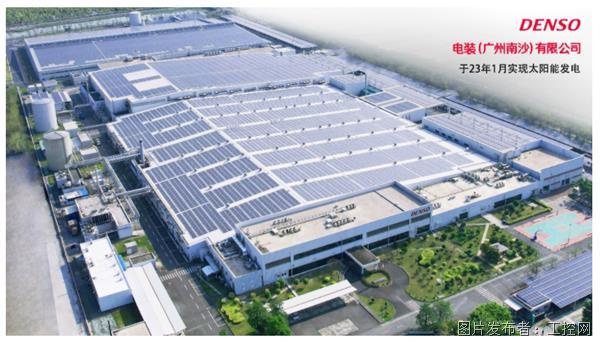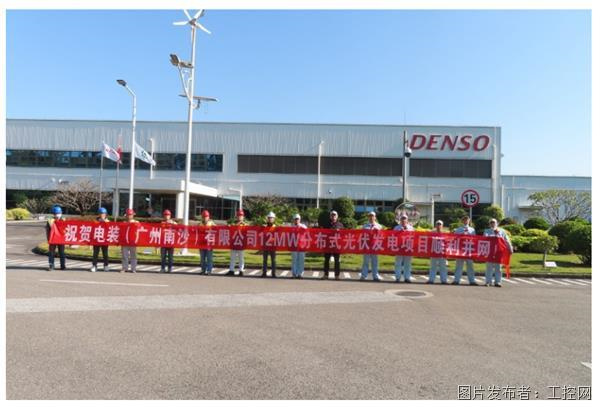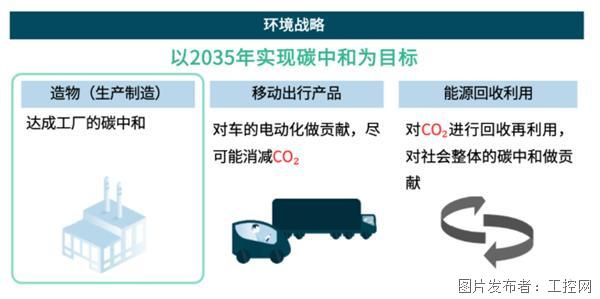With the goal of reaching the peak of carbon and carbon neutrality, the environmental protection competitiveness including energy conservation and emission reduction has gradually become the embodiment of the sustainable development ability and level of enterprises. Denso has been implementing environmental protection since it entered China in the 1980s. In recent years, Denso has been actively making efforts in the field of “sustainable development”, adhering to the principle of environment and peace of mind, practicing corporate social responsibility, and making contributions to the establishment of an environmentally friendly society in China.
Aiming to achieve carbon neutrality by 2035, Denso has developed environmental strategies i
n three areas: manufacturing, mobility products and energy recycling. Among them, Denso’s goal of carbon neutrality for the factory is 2025. The realization of this goal cannot be achieved without energy conservation, energy creation, purchase of renewable energy and other ways. Among them, Eneng (solar roof power generation), as an ideal clean energy, is an important part of achieving carbon neutrality. In December 2022, the 12MW distributed photovoltaic power generation project imported by Denso (Guangzhou Nansha) Co., Ltd. was successfully connected to the grid, which is the largest base of solar roof power generation equipment imported by Denso China Group so far.
Denso (Guangzhou Nansha) Co., LTD. (hereinafter referred to as “Denso Nansha Factory“) was established in 2004, located in Huangge International Automobile Industrial Park, Nansha District, Guangzhou, with about 2200 employees. Mainly engaged in automotive engine control system, horn, automotive electronic control products and equipment mold production and management. The company has always adhered to the principle of “people-oriented” and the business philosophy of “protecting the natural environment and co-existing with the society”. It is committed to providing the society with high quality products focusing on environmental protection by using advanced technology.

Denso (Guangzhou Nansha) Co., LTD
Cui Qinggao, head of the carbon neutral plant of Denso Nansha, has been engaged in energy management for more than 10 years. According to him, in order to achieve the goal of carbon neutrality by 2025, Denso Nansha plant will accelerate the promotion of energy conservation, energy creation and renewable energy purchase as the main line.
Energy conservation is mainly promoted by the department of Anhuan, which is divided into three groups: supply side, production side and business side. Every year, the leaders of the three groups collect the energy conservation cases of the current year, review the feasibility together with Anhuan, and finally determine the cases with high cost performance. In terms of energy generation, rooftop power generation is a more realistic and effective solution than wind, geothermal, hydropower and solar power, which are highly dependent on climate and environment. Denso’s Nansha plant uses new thin solar panels for safety reasons such as load-bearing. In terms of purchasing renewable energy, we are in close communication with Denso China headquarters and the local energy bureau, Industry and information Technology Bureau, etc., to purchase renewable energy at an appropriate time so as to achieve the goal of carbon neutrality in 25 years.
According to Cui Qinggao, the 12MW distributed solar power project introduced by Denso Nansha plant has a total installed area of 83,000 square meters, a total installed capacity of 12MW, and an annual generating capacity of 13.2 million KWH. It is estimated that by 2025, it can provide 21% of the electricity consumption and cut about 13,400 tons of CO₂ emissions *1.

The distributed photovoltaic power generation project of Denso Nansha plant was successfully connected to the grid
Ma Jiehong, deputy head of Nansha District government, said that achieving the “double carbon” goal and developing innovative energy is an important strategic approach. In this context, Guangdong Province and its municipalities have successively announced the “14th Five-Year” energy development plan. Nansha District has a natural advantage in the development of solar rooftop power generation. The introduction of the solar power project into Denso Nansha Factory not only responds to the national strategy of innovative energy, but also sets an example and demonstration role for other enterprises in the area.
Since 2021, 10 Denso China production stations have either completed or are promoting the introduction of solar power generation systems, which will reduce CO₂ emissions by 36,000 tons per year. At the same time, 8 strongholds have obtained the provincial and municipal green factory, among which 3 strongholds have applied for the national green factory certification. In the future, Denso will continue to implement environmentally friendly production and operation, and continue to achieve carbon neutrality by 2035, contributing to the realization of China’s two-carbon goal. (Note: Emission *1 from Denso internal statistics)
 1 Year Warranty
1 Year Warranty





